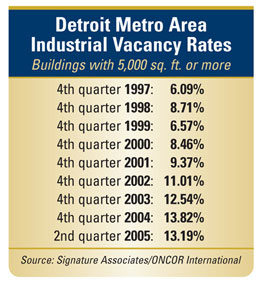Supplier Shuffle in Michigan
Despite the on-going struggles of U.S.-based automotive companies, Michigan remains in their hearts — and in their facilities plans, at least for the near future. Earlier this year, Chrysler announced a massive overhaul of several older facilities, to the tune of more than $500 million. The deal was sweetened by an $18.8-million Single Business Tax credit, plus an Economic Development Job Training Grant valued at $500,000 to win the project. The city of Sterling Heights approved abatements of the company's new personal property taxes totaling more than $17.8 million.
GM and Ford also made major Michigan announcements this year, even as the two car makers try to reverse the bad news on

|
But the trickle-down effect of automotive hard times is apparent. Oncor International reports a 13-percent industrial vacancy rate for the Detroit metro area as of second quarter 2005 — more than double the number a decade ago. "There is no question that these rates are on the high side right now," comments Oncor's Nicole Gutkowski.
Suppliers are feeling the pain. Visteon announced a $1.5-billion loss for 2004. Delphi reported 2004 losses totaling $90 billion. Meantime, Tower Automotive filed for bankruptcy, citing rising steel costs and lower production volumes. And Southfield-based Lear Corp., one of the world's biggest automotive interiors suppliers, announced grim restructuring news that could include closing or consolidating more than 20 plants, with layoffs that could affect 7,000 workers.
Lear operates several facilities throughout Michigan. Company spokesperson Andrea Puchalsky tells Site Selection that final decisions on closings and on new openings will depend on the strategic directions of Lear's customers: "If our customers — like Ford and GM — continue to commit to Michigan, for example, then we'll keep operations here."
Puchalsky acknowledges that the company is looking at shifting some operations to lower cost countries, because customers are demanding lower prices. However, some of Lear's products — such as seat assemblies — are so large that it would make little sense to ship them from China into the US.
Unlike manufacturers in other industries, though, Lear's location decisions are less dependent on variables such as labor costs, business environment or state incentives. "We just built a plant in Alabama — not because it's a right-to-work state," Puchalsky explains. "It's not about employee health care costs. It's not about unions. It's not about tax credits. We went to Alabama because our customer is there."
Even as Lear and other Michigan-based automotive companies are looking east to China, Chinese automotive companies are thinking that Michigan is the place to be. Wheel supplier Rosta International has decided to expand into what it says is the heart of U.S. automotive manufacturing — not the south, but Michigan. The company is establishing a technical center in the Detroit area, with plans to draw from the broad and deep pool of highly skilled automotive workers in the region for engineering and design work. "There is a technology gap for Chinese suppliers," explains Rosta vice president Richard Miller.
"Michigan has a great labor market of well educated workers, and this is what we are looking for. We can also draw on the universities for the engineering expertise we need, and Michigan has."
The company will keep its manufacturing in Shanghai, but design will shift to the Michigan facility. Rosta is in the midst of a site search within the Detroit metro area. "With vacancy rates being what they are, we are in a great position, because we do have our pick of several sites," Miller says.
State officials, for their part, have voiced concern over the precariousness of Michigan's manufacturing base, and the fact that companies in expansion mode may not look favorably on Michigan locations. Yet they continue to squabble over how to make the state more competitive. Talks on eliminating the single business tax, a hot topic several months ago, have stalled. And while discussions continue on other ways to ease the state's corporate tax burden, no consensus has emerged. Looming in the backs of lawmakers minds: the recent Cuno U.S. Court of Appeals decision, disallowing the tax incentives DaimlerChrysler received from the state of Ohio in 1998.
Beyond incentives, Michigan is making efforts to move the state away from its traditional dependence on automotive manufacturing. "There is a greater focus on technology, not just in the automotive sector, but in life sciences and in homeland security," Donovan observes. For these industries, education is key, and Michigan institutions are responding. The University of Detroit has just added a new Masters of Science in Information Assurance degree, for example. The curriculum includes coursework in computers, engineering and criminal justice.

